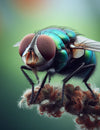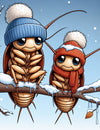
Everyone is suffering from pests nowadays. However, many methods use chemicals readily available for pest removal. But they may cause some very dangerous harm to our respiratory system, especially for kids and golden age people, as their immune systems do not have much strength to fight problems.
What is pest

Household pests are insects or animals that can destroy your house and harm humans and their food. And not only that, but they can affect your health as well.
For example, they can cause health issues by stinging and biting.
Type of pest
There are many kinds of insect species we are surrounded by. Some of them we usually catch sight of at our houses. Such as ants, mosquitoes, flies, rats, etc.
1. Ant
Ants are the most common insect we have in our house. More than 10,000 species occur around the world. They often live in colonies that can contain 1000 members.
2. Cockroach
Cockroaches are members of the order Blattodea. They are between 350to 400 million years old, estimated by experts. They usually go for wet, dark, and warm places such as behind sinks, refrigerators, inside furniture, and sewers.

To buy organic cockroach killer gel click here.
In houses, cockroaches are mainly found in the kitchen and can spread many illnesses, such as dysentery, leprosy, cholera, and food poisoning.
3. Mosquitoes
Mosquitoes mostly approach in the summer, but they can be found year-round. However, they usually prefer warm, humid weather, so they are often seen around still water.
Mosquitoes live by sucking on the blood of humans. And able to spread diseases like malaria, yellow fever, the Zika virus, and the West Nile virus.
They can quickly enter the home through windows, cracks, holes, and other openings.
4. Flies
Like mosquitoes, flies can enter your house through windows, holes, and cracks and eat rotten food, garbage, and manure.
Flies mature just in a few days, so that you may have flies infestation just in a short period. However, the worst part of having a fly infestation is they transmit diseases like diarrhea, typhoid fever, and cholera and can also cause eye infections like trachoma.
5. Bed Bugs
Bed bugs are small, oval-shaped, brownish insects that live on human blood and animal. Adult bed bugs are flat that can swell up by sucking on human blood and become reddish. Bed bugs can scroll on floors, walls, and ceilings but don't fly.
Bed bugs can scroll on floors, walls, and ceilings but don't fly. The female tendency of bed bugs may lay a hundred eggs. The maturity state of immature bugs depends on the blood they take.
They often result in itchy red spots. Generally, the locations are exposed on areas like the neck, face, and hands.
Most people use pesticides to get rid of pests. But pesticides are combined with hazardous chemicals, also known as chemical compounds. Pesticide chemicals may affect crops and carry diseases such as malaria and typhus. Some pesticide chemicals can also cause serious health issues like cancer and tumors.
Pesticide Toxicity:

Schedules are used to define the dangerousness of the pesticide chemicals. They consider how toxic the chemical substance is, how it will be used, and what form it will take (for example, powder, liquid, or spray).
Pesticides include either unscheduled or into schedules 5, 6, or 7. Each plan has a warning, which appears on the label.
| Scheduled Poison | Toxicity Level | Label Warning |
| Unscheduled |
lowest (readily available) |
some may display (keep out of children) |
| Schedule 5 | slight | caution |
| Schedule 6 | moderate | poison |
| Schedule 7 | high | dangerous poison |
Harm to the Environment
Several pesticides, like spray, give fast results and kill pests quickly. But despite their benefits, pesticides can be reckless to humans and the environment. Numerous chemicals are present in pesticides that can linger in the background for years and are prone to toxicity.
While some other pesticides only intended to affect pests may also be dangerous for animals and birds; for example, if a bird consumes an insect that is killed by insecticide may be poisoned.
Pesticide Impact on Health
Pesticides can be liquid, powder, spray, or solid. They can easily affect your body by touching your face or body and rubbing your eyes after using the pesticide: Inhale pesticide vapor, mist, or particles. Be in direct touch with pesticide-affected cloths or touch the pesticide-treated surface.
Pesticides can cause short-term (acute) and long-term (chronic) effects on human health.
1. Acute (immediate) Health Effect
The immediate health effect of pesticides is irritation in the throat, nose, and skin, which causes burning, itching, rashes, and blisters.
It can also cause headaches, nausea, dizziness, and blurred vision. In addition, in some cases, a person can have diarrhea, sweating, and stomach cramps due to pesticides.
In some cases, pesticide poisoning has the same symptoms as colds or flu.
Since pesticide-related illness causes the same symptom as usual, pesticide poisoning is underreported.
Pesticide poisoning's immediate (acute) symptoms are not severe enough that one may need medical attention.
2. Chronic (Long Term) Health Effect
Chronic health effects involve cancer and other tumors like brain and nervous system damage. It can also cause damage to the liver, kidneys, lungs, and other body organs.
Chronic effects may not emerge for weeks, months, and even sometimes for years and then appear to make it difficult to link it with pesticide poisoning.
Some pesticides even have chemical compounds that are deadly to humans if consumed by humans, even by inhaling the vapor.
Some pesticides are endocrine disruptors and can cause serious animal harm, including cancer and development problems. And may cause a similar effect on the human body also.
3. Pesticide Exposure Factors
Children, pregnant women, and golden-age people are much more vulnerable to pesticide exposure. In the case of children, their immune system, nervous system, organs, and other biological systems are still in developing states which are more vulnerable to pesticide toxicity.
Children have higher respiratory rates, so they inhale the pesticide chemical faster than adults. While pregnant women and golden age people case, their immune systems become weaker to handle the toxic element and pesticides.
The alternative to Pesticides
Instead of using pesticides saturated with chemicals, you can use Organic ways to remove pesticides. Removing the pesticide from the organic way might take some time, but it will not be harmful to your health.
We all know Health is Wealth, so why suffer from chemicals when there are other ways to deal with pests? Use organic and be healthy and remove problems in a non-toxic way.




